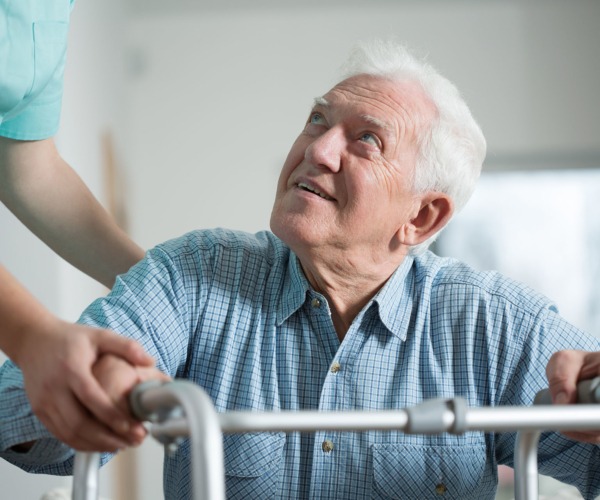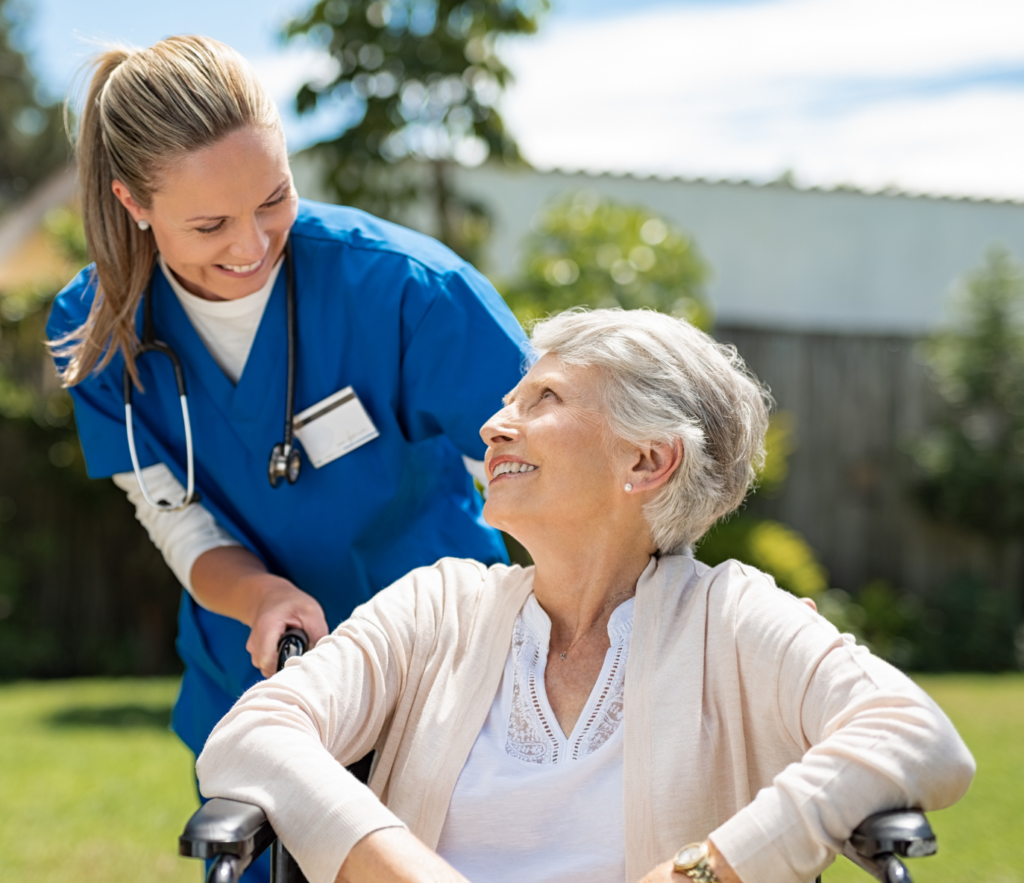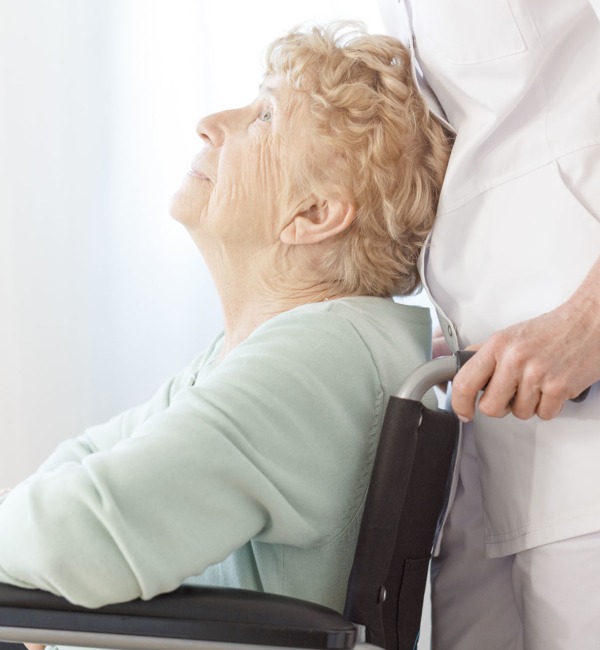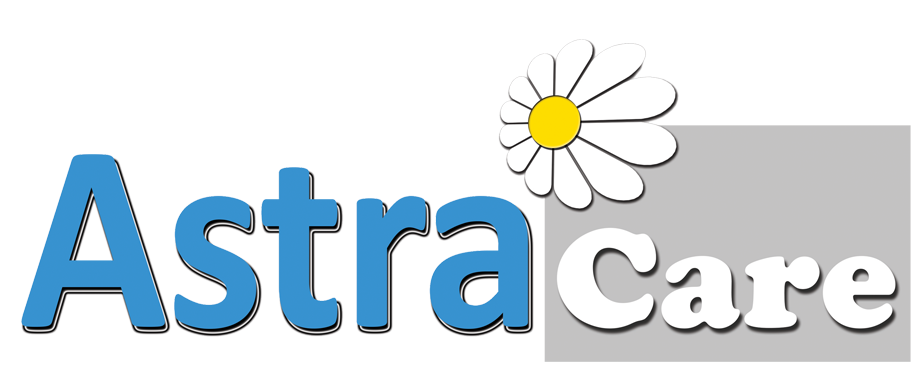Feeding Tube Care

Feeding Tube Care A feeding tube delivers nutrition directly into the stomach when a person experiences difficulties with eating and swallowing. The nutrition provided through the feeding tube typically consists of canned nutritional formulas, which vary based on the person’s age and medical condition. Additionally, there are “Real Food” diets available as meal replacements. These pureed meals made from real food can be used if a person can digest real food but should replace only 1-2 cans of supplemental diet daily. Feeding tubes ensure that daily nutritional requirements are digested and absorbed directly into the GI tract. Managing tube feeding requires a skilled nurse due to the potential for severe complications if not adequately trained or licensed. Therefore, before administering any liquid or puree into the feeding tube, it is imperative to ensure the feeding tube is still safely positioned in the stomach. An AstraCare-trained professional will ensure you understand how to safely check the tube’s placement. Once it is confirmed that the feeding tube is safely positioned, rinsing the tube with water clears any old sediment or debris and prepares it for the next feeding cycle. AstraCare’s skilled team will help the patient and their loved ones manage tube feedings safely and independently at home. An Astracare Professional Will Observe For Any Of The Following Complications A feeding tube clog is the most common complication to occur; reasons including a small-bore feeding tube, slow administration rate, sticky sediment that can accumulate inside the tube, as well as improper administration of mediations through the tube. AstraCare’s trained professionals will teach you how to safely clear the clog or will notify your doctor if needed. The most serious complication can be “Failure to Thrive” and the doctor should be notified immediately. Feeding tube clogs Bleeding or infection at the tube insertion site Nausea, vomiting, diarrhea Gastric Reflux and/or regurgitation Gastric leakage Tube feeding intolerance
Ostomy Care

Ostomy Care AstraCare offers specialized and knowledgeable nursing care to patients who have an ostomy. Our goal is to maximize our patients quality of life and learn to live comfortably with an ostomy pouch. Our trained nurses and caregivers will help patients maximize their independence and teach patients and their loved ones to care for the ostomy. Comprehensive Colostomy Care by AstraCare Nurses: Pouch Management: Our nurses skillfully handle the emptying and replacement of colostomy pouches, ensuring comfort and hygiene. Cleaning Protocols: They meticulously clean both the affected area and the surrounding skin, maintaining the highest standards of cleanliness. Skin Care: Our nurses provide thorough care for the skin around the stoma, preventing irritation and promoting healing. Dietary Education: AstraCare nurses educate patients on adhering to dietary guidelines prescribed by their doctors, helping to minimize discomfort and enhance well-being Your Caregiver Will Manage All Aspects Of Your Ostomy Care Including: Gastrointestinal Symptoms: Including the presence of bloody or black stool. Stoma Health: Addressing any bleeding at or on the stoma. Abdominal Concerns: Managing severe abdominal pain. Physical Weakness: Assisting if there is weakness with an inability to stand. Fever Management: Monitoring and addressing any persistent fever. Odor Control: Investigating and resolving persistent odors emanating from the bag lasting more than one week. Skin Integrity: Caring for skin around the stoma that becomes red and irritated. Digestive Distress: Alleviating symptoms of nausea, vomiting, cramps, or abdominal bloating. Bowel Function: Ensuring regular bowel movements through the stoma and addressing any delays. Stoma Monitoring: Noting and responding to changes in the size of the stoma. AstraCare nurses are trained to manage all aspects of colostomy care with expertise and compassion.
Companion Care

In-Home Companion Care Too many seniors face situations where they have little to do but watch TV all day. We believe that continuing to enjoy your favorite hobbies, tasks, social activities, and the company of others is critical to your happiness and wellbeing. Our caregivers want you to continue living your best life, even when medical concerns get in the way. By having your companion assist you throughout the day, you can enjoy the things you love to do. We never want you to feel like a patient, but a friend. That is why we offer as many companion care services as possible with kind and competent caregivers. Every member of our team is fully qualified and licensed to assist you with anything that you need. Whether it is daily medication reminders or help getting around town, we are here for you. When You Choose Astracare, We Do Our Best To Help You Enjoy The Things That You Love Doing The Most. Call Now To Discuss Your Individual Needs. Companion Care Services Include: Plan and attend appropriate social activities. Encourage hobbies and activities of interest. Maintain light housekeeping, such as dusting, sweeping, mopping, organizing, and laundry. Plan meals and taking dietary restrictions into consideration. Build a sincere interest in the client’s wellbeing. Ensure that the home is clean and safe. Co-ordinate home maintenance when needed. Encourage a healthy lifestyle and exercise. Monitor wellbeing and report any concerns to doctors and family members. Accompany client to Doctor’s visits. Handle errands for or with client, such as grocery shopping, paying bills, writing letters, etc. Provide emotional support for clients suffering with anxiety or depression. Maintain regular communication with family to ensure peace of mind. Caregiver and client have access to RN support 24/7. Support With Activities Of Daily Living: Activities of daily living (ADLs or ADL) is a term used in healthcare to refer to people’s daily self-care activities which include; Bathing Dressing Mobility Transferring and Positioning Incontinence Care Feeding/Hydrating
Post Stroke Care

Your Loved One Has Had A Stroke, Now What Do You Do? After hospitalization, we are faced with the reality that our loved one is different, there may be minor changes or major changes preventing them from communicating clearly, walking, standing, turning themselves over and more. How can we take care of them? Can I do this alone? Should I put them into a facility? Should I sell our home or take out another mortgage? All of these questions and more come flooding into our minds causing fear and overwhelm. AstraCare can provide you with the easiest decision, which is allow AstraCare to help you care for your loved one, safely in their own home. How Can Astracare Help You Or A Loved One Recover From A Stroke? Hire A Company With A Team Of Highly Skilled And Caring Professionals The most essential tool in your recovery is choosing a highly skilled in-home care team capable of implementing all essential tools to support, encourage and assist with all of the in-home recovery. At AstraCare we provide the most qualified, trained and caring health care professionals available for 24-hours a day, 12-hours daily or whatever your needs are. AstraCare will work with your physicians and hospital professionals from the moment of discharge in order to arrange a seamless transition back to your home. Understand And Implement The Modifications Necessary To Safely Transition Your Loved One Back Into The Home AstraCare’s team of highly skilled professionals will work with social services in order to safely modify your home. AstraCare will coordinate with an Occupational Therapist to make all necessary and safe modifications; such as, does the patient need a hospital bed? Do we need to remove excess furniture for a more open passageway? All of these modifications can be supervised and implemented by our professional staff. AstraCare will make sure we have bathroom bars, a walker and or cane, wheelchair if needed. Understand Rehabilitation Goals As Prescribed Studies show that more than 4 million stroke survivors experience difficulty walking making it essential to implement an in-home rehabilitation program as soon as possible; it is extremely important to have the most qualified team surrounding you. Your AstraCare team will follow your doctors prescribed plan of treatment which may include physical, occupational and or speech therapy. Following the routine, keeping all appointments and reinforcing in-home strength and balance training with your AstraCare professional can shorten the length of time for your recovery. Emotional Support It is essential to remember that not only does the stroke patient experience fear and grief of their unknown future and the changes in their body, but their loved ones may experience fear and grief as well. Being cared for in your home by AstraCare is an added benefit to the stroke patient, who can feel safe in a familiar, non-threatening environment which can help the patient maintain a positive attitude helping them recover some skills more quickly. It can also, help their loved ones maintain a positive attitude. Keep an open line of communication; talk about the changes, your fears, worries and needs. It is not uncommon for a stroke survivor to fall into a depression, so speak with your medical professional about the possibilities of medication or therapy. An AstraCare trained professional will observe the mood of your loved one daily, will engage them in safe conversations and support them at their weakest moments. It may be necessary for the patient or loved ones to find outside resources, such as support groups for additional support and guidance. Healthy Lifestyle And Diet Strokes can be a direct result of an unhealthy lifestyle, stress or bad eating habits, so it’s important to meet with your doctor to decide on a healthy diet that will work in preventing secondary strokes, reduce high cholesterol and help lower blood pressure. Your AstraCare professional will help with grocery shopping, meal preparation, serving food and, if needed, feeding. Reducing the amount of fat and sodium will be strictly observed while encouraging healthy foods and adequate fluids. Encouraging your doctor prescribed daily exercises can facilitate a speedier recovery and lower the chances of future strokes. The risk of a second stroke or TIA remain high for the first 5 years, so having your AstraCare aide be trained in the signs to watch for is imperative. RN Supervision Once you make the decision to go with the highly skilled team at AstraCare our Registered Nurse is involved with all aspects of care. AstraCare’s RN will immediately communicate with the loved ones to help them adjust to the changes in their lives. A free, confidential nursing assessment, history and medication review is provided and a copy of the medication sheet is left in the home. This medication sheet can be brought along to all medical visits as well as assist our AstraCare team and family. A Plan of Care is done by the RN in conjunction with the doctor and left in the home to help the caregiver. The AstraCare RN is available by phone 24 hours-a-day or for necessary in-home visits. AstraCare’s RN can help find and make appointments with specialty doctors, or can provide comforting support to the stroke survivor and their loved ones. At AstraCare you are not alone during this time and our RN can help you navigate through the journey. Risk Factors for a Stroke A stroke is a serious medical condition which is caused by poor blood flow to the brain which then causes death to the brain cells. Ischemic, due to a loss of blood flow. This can be treated with medication, that can break down the clot if detected within three to four and half hours. Hemorrhagic, which is due to bleeding in the brain, is caused by either bleeding directly into the brain or into the space between the brain’s membranes. Both of these may cause parts of the brain to stop functioning properly. TIA’s (Transient Ischemic Attack) which is also referred to as a “mini-stroke” presenting with symptoms
Parkinsons Care

Parkinson’s In-Home Care A Parkinson’s diagnosis profoundly impacts both the patient and their loved ones, often triggering denial, fear, anger, or guilt. AstraCare’s expertly trained caregivers and comprehensive care programs are dedicated to enhancing daily living and managing symptoms effectively for Parkinson’s patients. Educating yourself helps prepare for the inevitable changes in behavior and the physical, mental, and emotional needs that arise. How AstraCare Can Support You and Your Loved One with Parkinson’s Disease Respite Services AstraCare provides skilled caregivers trained in non-medical care, offering respite for family members. Caregivers assist with household tasks, meal preparation, and errands, allowing primary caregivers to focus on their own needs. Daily Hygiene Assistance Our caregivers aid with bathing, dressing, eating, and other daily activities, helping to alleviate the burden on primary caregivers. Ensuring Safety AstraCare’s team can make necessary home adjustments to enhance comfort and safety for those with Parkinson’s, such as securing rugs, adjusting furniture, and installing safety bars. Exercise and Physical Therapy: Recognizing the importance of physical activity in managing Parkinson’s, our caregivers encourage daily exercise routines and coordinate with physical therapists to maintain mobility. Managing a Healthy Diet: Caregivers assist in preparing balanced meals and managing dietary needs to prevent complications like constipation and maintain overall health. Medication Management Our caregivers ensure timely medication administration, coordinating with healthcare providers to optimize treatment effectiveness. Cognitive Support We incorporate cognitive exercises into daily activities to enhance mental engagement, including games and crafts that promote dexterity and memory. Social Interaction AstraCare helps maintain social connections by organizing outings and activities that align with personal interests, providing much-needed social stimulation. Monitoring Progression Our caregivers are trained to observe and report any changes in condition or behavior, providing essential updates for healthcare providers. Support Groups AstraCare connects patients and caregivers with support groups, offering a network of support and shared experiences to navigate the challenges of Parkinson’s together.
Respite Care

Personalized Respite Care Services Many family caregivers do an excellent job caring for their loved ones. However, providing care can be difficult and challenging especially when you are doing more than your abilities and circumstances allow. Respite care provides short-term relief for primary caregivers. It can be arranged for just an afternoon or for several days or weeks. Care can be provided at home, in a healthcare facility, or at an adult day center. In-Home Respite Care Services Juggling caregiving responsibilities while maintaining personal wellbeing and relationships is demanding. Whether you need time to relax, attend appointments, socialize, or exercise. Astracare Is Here To Support You. Tasks That Can Be Performed During Respite Care Include: In-Home Respite Care Daily Personal Care and Dressing Assist with Meal Preparation Healthy Meal Planning and Grocery shopping Help with driving to a doctor’s appointment Picking up prescriptions Assistance with Mobility/Exercise Homemaking and Light Housekeeping duties such as vacuuming, and laundry Assist with physical needs Companionship and Comfort Encourage Reading, Games and Arts & Crafts Maintain medication sheet in case of emergency Let’s Discuss How We Can Help You Take Advantage Of The Multiple Benefits Of Respite Care. Click Here WHY RESPITE CARE? When the need for a little respite arises many rely on friends, family members, and volunteers to assist. Unfortunately, many of these individuals are not the same as those who have received the necessary training. While it’s nice to have a familiar face around the home, you need dependable healthcare professionals to keep your loved one safe, healthy and medically cared for. Call us now to discuss how we can help you take advantage of the multiple benefits of respite care.
Post Hospitalization Care

Post Hospitalization Care As we get older there is an increased risk of hospitalizations, many of these can be life changing and recovery should be the first concern. Upon discharge AstraCare will establish a skilled, caring team of professionals to help with the transition and support all in-home care needs safely and confidentially. The AstraCare care-provider will work to prevent further injury or falls and make sure healthy meals are prepared following all dietary guidelines. During the recovery and convalescence, AstraCare’s team of Professionals will provide a safe environment which is conducive to a speedier recovery. How AstraCare can help you Post-Hospitalization: AstraCare’s skilled caregivers provide the following post-hospitalization services to support recovery comfortably at home. Home Safety Modifications: Ensure safe, unobstructed pathways and remove obstacles to prevent falls. Rehabilitation Coordination: Arrange additional rehabilitation personnel such as physical, occupational, or speech therapists as needed. Medical Appointment Management: Follow up with doctor visits, set calendar reminders, and provide transportation for all appointments. Personal Care Assistance: Help with personal hygiene, dressing, and grooming to maintain comfort and dignity. Errand Services: Run errands, do grocery shopping, and manage prescription pick-ups and deliveries. Nutritional Support: Plan, prepare, and serve healthy meals; assist with feeding if necessary to ensure proper nutrition. Hydration Monitoring: Monitor daily hydration and encourage adequate fluid intake to aid recovery. Health Monitoring: Be observant of any signs of change in health and contact medical personnel or family immediately if concerns arise. Emotional and Social Support: Provide support and comfort, encourage social activities to enhance mental health. Household Management: Perform light housekeeping, bed making, and laundry to maintain a clean and organized living space. Medication Management: Handle daily medication management and provide reminders to ensure compliance with treatment protocols. Mobility Assistance: Support with transfers, maintain daily exercise routines, and manage overall mobility to aid physical recovery. AstraCare’s nurturing caregivers significantly contribute to the comfort and recovery of your loved ones.
Alzheimer’s Care

Alzheimer and Dementia In-Home Care Here’s why AstraCare is your best choice. Experienced caregivers Our caregivers demonstrate patience and empathy, adeptly handling tough situations with kindness and skill. Early-Stage Support Assistance with mild symptoms such as memory loss and disorientation. Medication Management Ensuring timely and accurate administration of medications to manage symptoms. Progressive Care Management of increased symptoms such as anxiety, confusion, and wandering. Behavioral Support Skilled handling of aggression, agitation, and other challenging behaviors. Safety Measures Implementation of home safety protocols, including fall prevention and secure living environments. Flexible Scheduling Availability for both part-time and 24-hour care tailored to your needs. Personalized Care Plan The job of caring for a family member with Alzheimer’s disease is a difficult one. It can take a tremendous emotional toll on the caregiver and requires a great deal physical work and attention to detail. AstraCare can lessen the load by assessing the needs of your family member and creating a care plan that not only addresses their physical needs but focuses on preserving the highest quality of life they can enjoy. Our Alzheimer’s Disease In-Home Care Services Include: Plan of Care Tailored care plan developed by a Registered Nurse. Physical Safety Monitoring Vigilance for wandering, impaired motor skills, and coordination issues. Daily Living Assistance Help with bathing, grooming, dressing, and eating. Transportation Support Provide transport and assist with walking. Routine Establishment Create and maintain a patient-friendly schedule and routine. Home Safety Enhancements Implement measures to create a safe home environment. Respite Care Offer breaks for family caregivers. Obligations Management Assist with financial, correspondence, and medical appointments. Personal Goal Support Help maintain social connections and celebrate family events. Memory-Stimulating Activities Engage in writing, painting, puzzles, and reading. Emotional Support Offer comfort and reassurance to patients and families. Resource Provision Supply information on Alzheimer’s support groups and clinics. Contact Us Now AstraCare provides comprehensive Alzheimer’s and Dementia care, addressing all areas of need with expertise and compassion. ALZHEIMER’S DISEASE (AD) Alzheimer’s is a progressive disease that destroys cognitive functions over time. Alzheimer’s is a progressive disease with many stages and manifestations. Symptoms can range from memory loss to complete loss of motor skills, erratic behavior and the inability to communicate. By understanding the disease itself and what stage the patient is in and how the patient is affected, the caregiver can develop a strategy for care and establish priorities.
Therapy Dogs

THERAPY DOG “Woof Woof! My name is Bentley, and I am eager to meet you!” I am an Australian Labradoodle and my birthday is January 30, 2014. I work at AstraCare as a therapy dog and I love my job! I visit our clients in hospitals and nursing homes to provide joy, affection, and encouragement. I love meeting new friends and making you smile. So, if you would like me to visit you, please call the office and the humans will make all the arrangements. Love, Bentley Benefits of having a therapy dog: Quality of Life – Interacting with animals reduce the stress aging adults may experience as they move through life transitions. Loneliness – Seniors report less loneliness, increased social interactions, and an overall improvement in their quality of life with pet therapy. Depression and Anxiety – Pet therapy has been linked to reductions in depression. The elderly shows the greatest improvements, including those seniors with cognitive impairment, disabilities, and or suffering from mental illness. Cardiovascular Health – Research has shown that pet therapy can lower blood pressure, lower heart rates, and improve recovery time during mental stress in older populations. Dementia and Alzheimer’s Disease – Pet therapy for patients with dementia can provide memory stimulation and calm negative behaviors such as agitation. Pet therapy for seniors can boost their well-being and improve their physical, mental, and emotional functioning. Interacting with a kind and affectionate animal can lower people’s stress levels and help them become more active. This can be immensely helpful to those struggling with loneliness or dealing with health conditions such as heart disease, cancer, chronic pain, or dementia.




